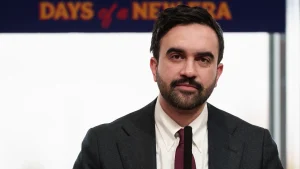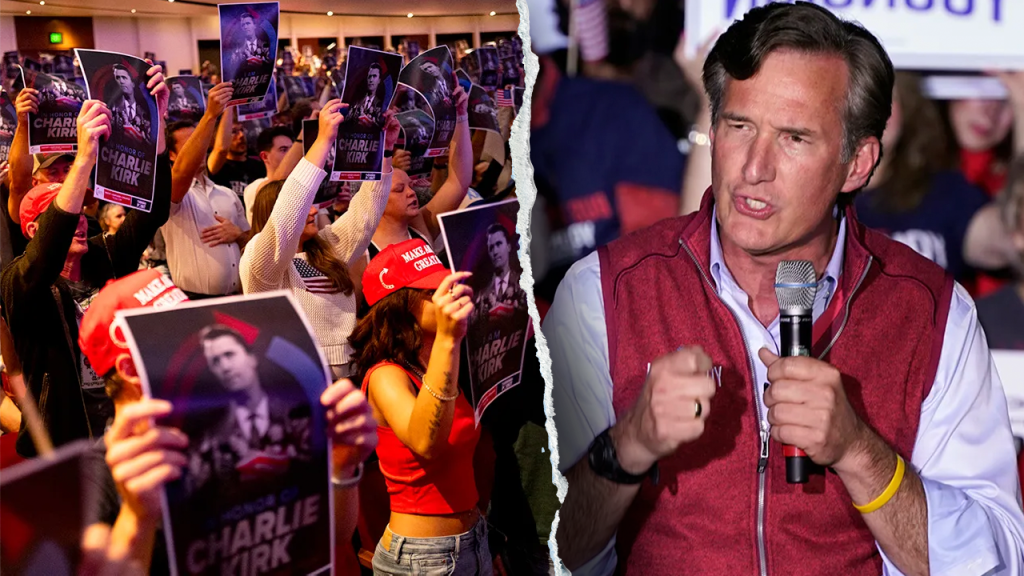A Message of Hope and Legacy: Youngkin Addresses Students After Charlie Kirk’s Assassination
In one of the first Turning Point USA events since founder Charlie Kirk’s tragic assassination, Virginia Governor Glenn Youngkin delivered a powerful message of hope, resilience, and continuity to students gathered at Virginia Tech University. Speaking to a packed auditorium as part of the “This is The Turning Point Tour,” Youngkin addressed the question that has been on many minds since Kirk’s death: who will carry forward his legacy? Looking out at thousands of young faces, the Governor offered a profound answer: “All of you are the next Charlie Kirk.” This collective call to action highlighted Youngkin’s belief that Kirk’s work would continue not through a single successor, but through the commitment of countless young conservatives inspired by his example. The gathering represented more than just an event; it symbolized the determination of a movement to persevere in the face of violence and tragedy.
The atmosphere at Virginia Tech carried both sorrow and resolve, coming shortly after Kirk was murdered at a similar event at Utah Valley University. Despite the shadow of this horrific act, Youngkin framed Kirk’s final moments as leaving behind a “blueprint” for advancing truth in the face of evil. “That morning Charlie left us with guidelines to once again benefit from a man who spoke truth,” Youngkin told the audience. “He left us again with something to reflect on our own lives.” This framing transformed Kirk’s death from merely a tragic ending into a powerful beginning—a call for young conservatives to reflect on their own purposes and commitments. Youngkin’s message emphasized that Kirk’s life work wasn’t just about political activism but about living with conviction and purpose, challenging the students to examine how they might continue this legacy in their own ways.
Youngkin’s address took on spiritual dimensions as he invoked Kirk’s Christian faith, telling students, “Each one of you is the light. A light that shines in the corner of the room, a light that shines brightly on evil. A light that chases out darkness.” This metaphor of light versus darkness resonated deeply with the audience, positioning their political and cultural engagement as part of a larger spiritual calling. The Governor powerfully countered the intended effect of Kirk’s assassination, stating, “A sniper’s bullet shot from a gun held by someone with a heart of evil tried to silence truth, tried to silence all of us. But you see, the exact opposite is happening.” Instead of silencing the movement, Youngkin suggested that Kirk’s death had catalyzed “a revival spreading across this great nation”—transforming a moment of loss into one of renewed commitment and growth for the conservative movement among young Americans.
Beyond spiritual encouragement, Youngkin celebrated Kirk’s practical legacy of active engagement and respectful dialogue. “One of the things that we all loved about Charlie Kirk is he not only spoke truth, but he challenged us,” the Governor reflected. “He challenged us to do more than sit on the sidelines. He challenged us to engage, to engage in thoughtful dialog, of course, recognizing we had to do it with respect, but to fully engage. Don’t back down from your beliefs.” This portion of Youngkin’s speech highlighted Kirk’s approach to political discourse—combining firm conviction with civil engagement—and encouraged students to adopt this model in their own activism. The message was clear: honoring Kirk’s legacy meant more than mourning his death; it meant embracing his approach to activism and dialogue in an increasingly polarized society.
In a touching moment during his address, Youngkin drew attention to Erika Kirk, Charlie’s widow, who has stepped into the role of Turning Point USA CEO following her husband’s death. Leading the crowd in applause for her, the Governor noted, “We see that the next leader of Turning Point is the person who knew Charlie the very best, someone who looked into his heart.” This acknowledgment highlighted both the personal dimension of the tragedy and the organizational continuity that Erika Kirk’s leadership represents. Her willingness to take the helm of the organization despite her personal loss has been widely praised, with many religious leaders particularly noting her public forgiveness of her husband’s accused killer as a powerful testimony to her Christian faith. This transition of leadership from Charlie to Erika Kirk symbolizes both the personal cost of the tragedy and the resilience of the organization he founded.
The event at Virginia Tech represents part of a larger movement continuing in Kirk’s absence. Just days earlier, more than 2,000 people had gathered at the University of Minnesota for the first Turning Point USA event following Kirk’s assassination. These gatherings are taking place against the backdrop of significant political contests, including Virginia’s contentious gubernatorial race between Republican Lieutenant Governor Winsome Sears and former Democratic Representative Abigail Spanberger. Youngkin’s message at Virginia Tech thus carried not only emotional and spiritual significance but also practical political implications as conservative students consider their role in upcoming elections. The continuation of these events despite the threat of violence demonstrates the determination of Turning Point USA and its supporters to maintain their presence on college campuses across America, turning a moment of tragedy into one of renewed commitment to their cause.















